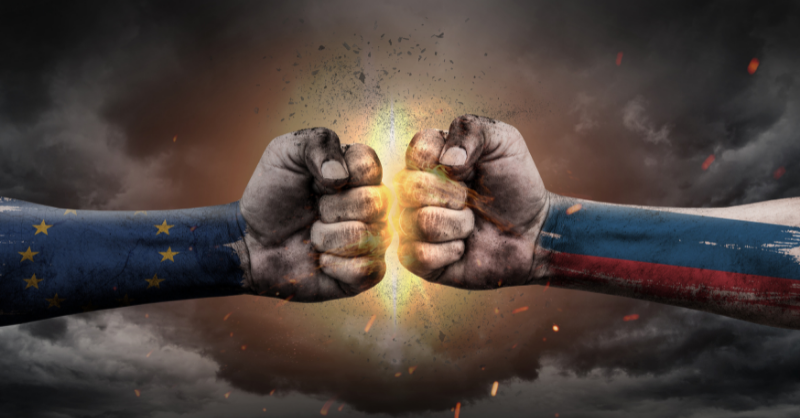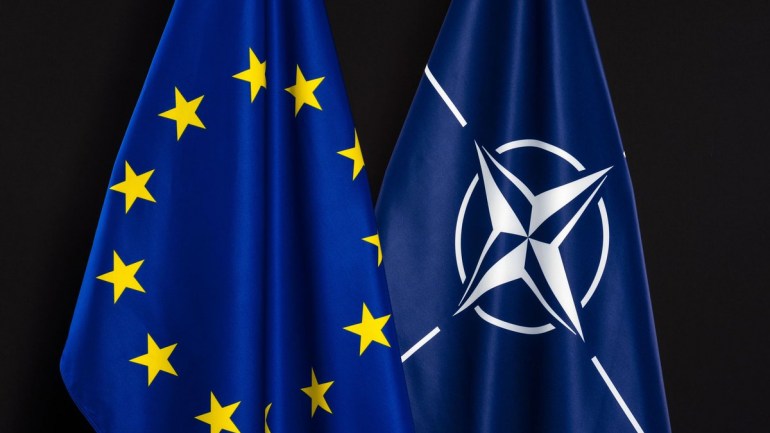
Russia’s full-scale invasion of Ukraine dispelled all assumptions that governed the European security order for the past three decades and raised the (in)security antes to a level not experienced since the beginning of the second world war.[1] With millions of Ukrainians currently seeking refuge across the EU’s borders and overwhelming accounts of the atrocities committed by Russia against Ukraine’s civilians,[2] warranted by nothing else other than Putin’s ambition of ‘denazifying’ the country of its ‘narcomaniac’ leadership,[3] the ongoing conflict led to a deluge of analyses, speculation and misrepresentation of its causes and future implications for the European political landscape.
Amidst the chaos of it all, one actor whose responsibility for the crisis eluded its due scrutiny has been the EU. Although Putin’s administration would have the European public believe that the ongoing conflict originates with NATO’s prospective enlargement after the 2008 Bucharest summit, the matter of fact is that Ukraine constitutionally abandoned its NATO membership perspective in June 2010, reconsidering it only in June 2017, more than three years after Russia’s initial military invasion.[4] Nonetheless, for Putin’s eschatological understanding of world politics, seen as a relentless contest for ‘spheres of influence’, the idea of Ukraine’s approximation with Brussels after the 2013 Association Agreement (AA) talks and subsequent events of the Euromaidan became increasingly coalesced with that of an attempt by the monolithic West to seize control over its brotherly former republic.[5]
Click Here to Read the Entire Paper
_____________________________________________________
[1] Josep Borrell Fontelles [@JosepBorrellF]. (2022, February 24th) These are among the darkest hours of Europe since the Second World War. Twitter. Available at: https://twitter.com/JosepBorrellF/status/1496759656391323651?s=20&t=sXT8n5iKqbAZzRkdSTS_-Q
[2]Olga, R. (2022, April 3rd) . The Kyiv Independent. ‘Hundreds of murdered civilians discovered as Russians withdraw from towns near Kyiv (GRAPHIC IMAGES)’. Available at: https://kyivindependent.com/national/hundreds-of-murdered-civilians-discovered-as-russians-withdraw-from-towns-near-kyiv-graphic-images/
Taylor, H. (2022, March 27th). The Guardian. ‘Russian soldiers raping and sexually assaulting women, says Ukraine MP’. Available at: https://www.theguardian.com/world/2022/mar/27/russian-soldiers-raping-and-sexually-assaulting-women-says-ukraine-mp
Borger, J. and Henley, J. (2022, March 4th). The Guardian. ‘Zelenskiy says “Europe must wake up” after assault sparks nuclear plant fire’. Available at: https://www.theguardian.com/world/2022/mar/04/ukraine-nuclear-power-plant-fire-zaporizhzhia-russian-shelling
[3] AFP News Agency (2022, February 25th). YouTube. Putin calls government ‘drug addicts and neo-Nazis | AFP. [Video] Available at: https://www.youtube.com/watch?v=rkos-aWbo7w&ab_channel=AFPNewsAgency
Weber, J. et al. (2022, February 25th). DW. ‘Fact check: Do Vladimir Putin’s justifications for going to war against Ukraine add up?’ Available at: https://www.dw.com/en/fact-check-do-vladimir-putins-justifications-for-going-to-war-against-ukraine-add-up/a-60917168
[4] Alexiyevets M. and Alexiyevets, L. (2020). ‘Ukraine – the NATO: Mutual Relationship and Partnership’s Main Stages’, Skhidnoievpropeiskyi Istorychnyi Visnyk [East European Historical Bulletin], 14(2020), pp. 175-189.
[5] Baczynska, G. and Hudson, A. (2014 February 14th). Reuters. ‘Russia accuses EU of seeking Ukraine “sphere of influence”’. Available at: https://www.reuters.com/article/us-ukraine-russia-eu-idUSBREA1D0PT20140214
Cordesman A. H. (2014). Russia and the “Color Revolution”. Center for Strategic & International Studies. Available at: https://www.csis.org/analysis/russia-and-%E2%80%9Ccolor-revolution%E2%80%9D
Dettmer, J. (2022, January 10th) VOA. ‘Putin: No More Color Revolutions’. Available at: https://www.voanews.com/a/putin-no-more-color-revolutions/6390636.html



